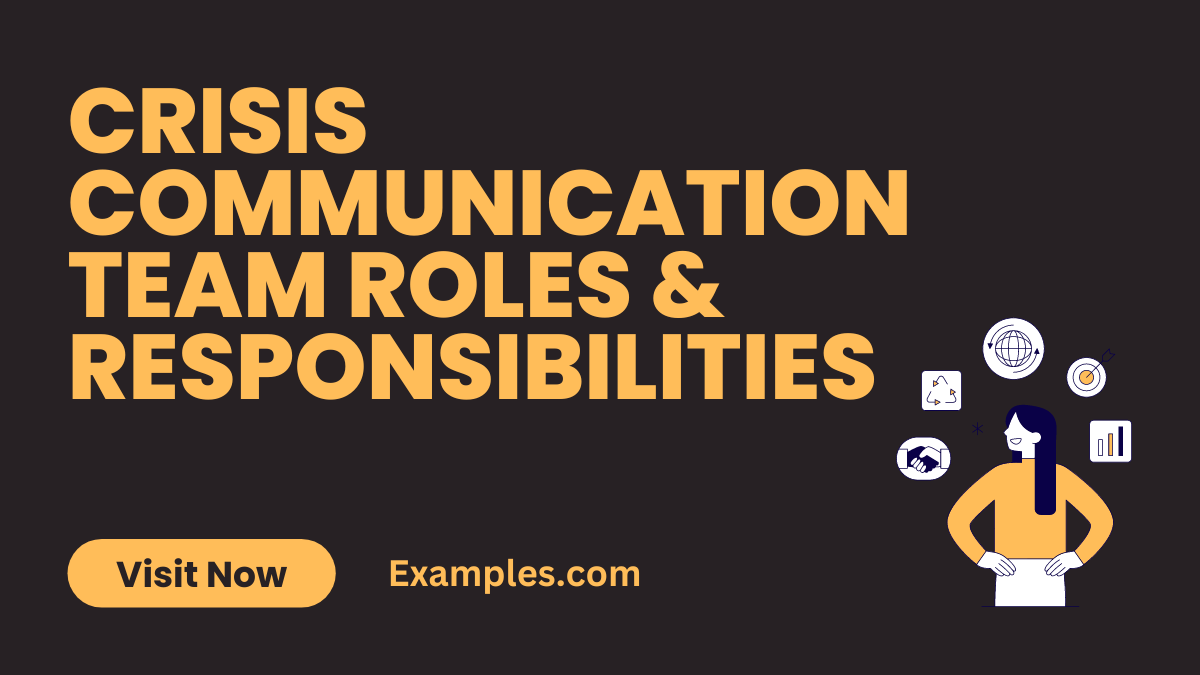14+ Crisis Communication Team Roles & Responsibilities
In the crucial arena of crisis management, the roles and responsibilities within a Crisis Communication Team are fundamental to success. This guide delves into the specifics of each role, from strategists and spokespersons to social media experts and analysts. Understanding these roles is key to forming a cohesive and effective team capable of tackling crises head-on. With real-world examples, we highlight how these roles operate in concert, employing effective communication and strategic planning to navigate and mitigate the impacts of crises. Dive into this comprehensive guide to grasp the full scope and significance of each role in crisis communication.
What are Crisis Communication Team Roles & Responsibilities?
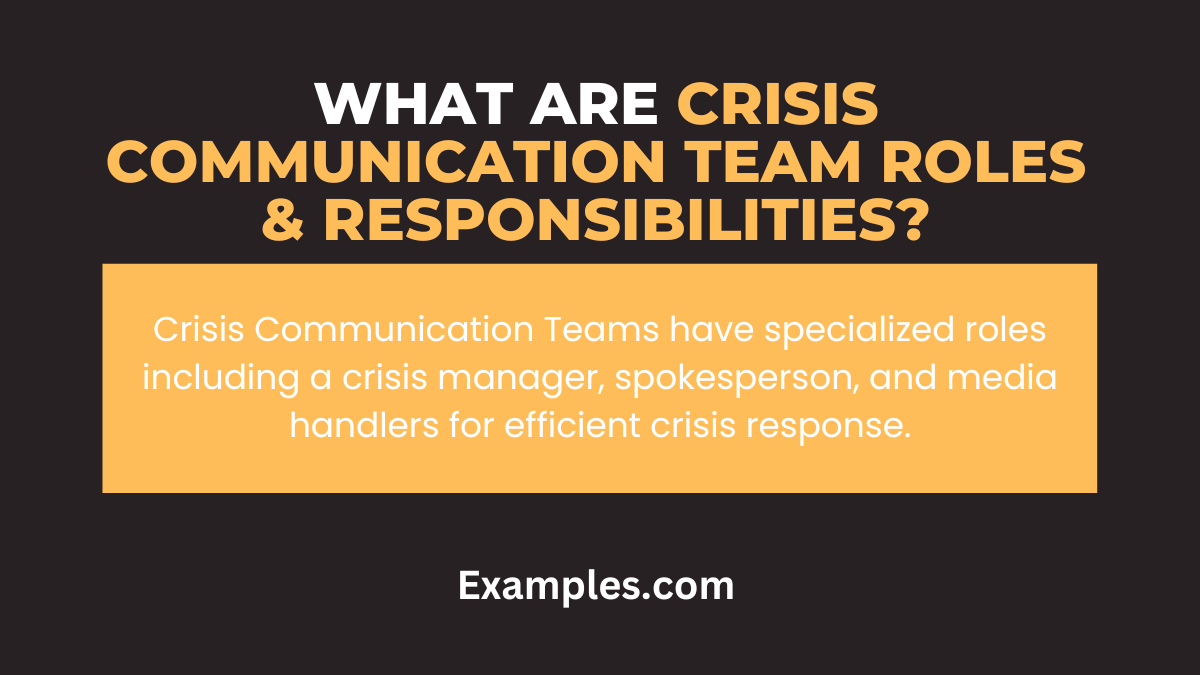
The Crisis Communication Team Roles & Responsibilities encompass a range of specific functions essential for effective crisis management. These roles include a crisis manager who leads and coordinates the team, a spokesperson who communicates with the media, and team members who handle internal communications, social media, and stakeholder engagement. Each role requires distinct skills like assertive communication, empathetic listening, and strategic thinking, crucial for maintaining the organization’s reputation and ensuring clear, accurate information dissemination during crises.
What is the Best Example of Crisis Communication Team Roles & Responsibilities?
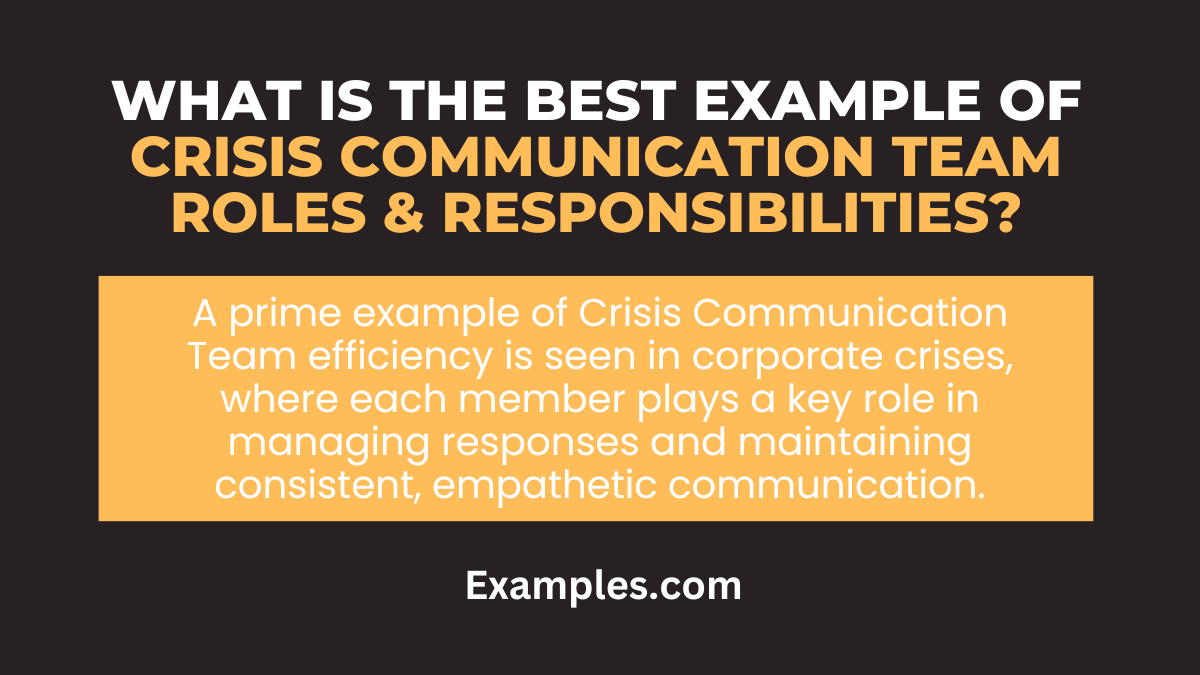
A prime example of Crisis Communication Team Roles & Responsibilities in action can be observed in large-scale corporate crises. For instance, during a product recall, the crisis manager oversees the entire response strategy, the spokesperson addresses the media and public concerns, while other team members manage customer inquiries and social media responses. This coordinated effort ensures that accurate information is relayed promptly, customer concerns are addressed empathetically, and the company’s response is consistent across all communication channels, showcasing effective crisis management.
15 Crisis Communication Team Roles & Responsibilities Examples
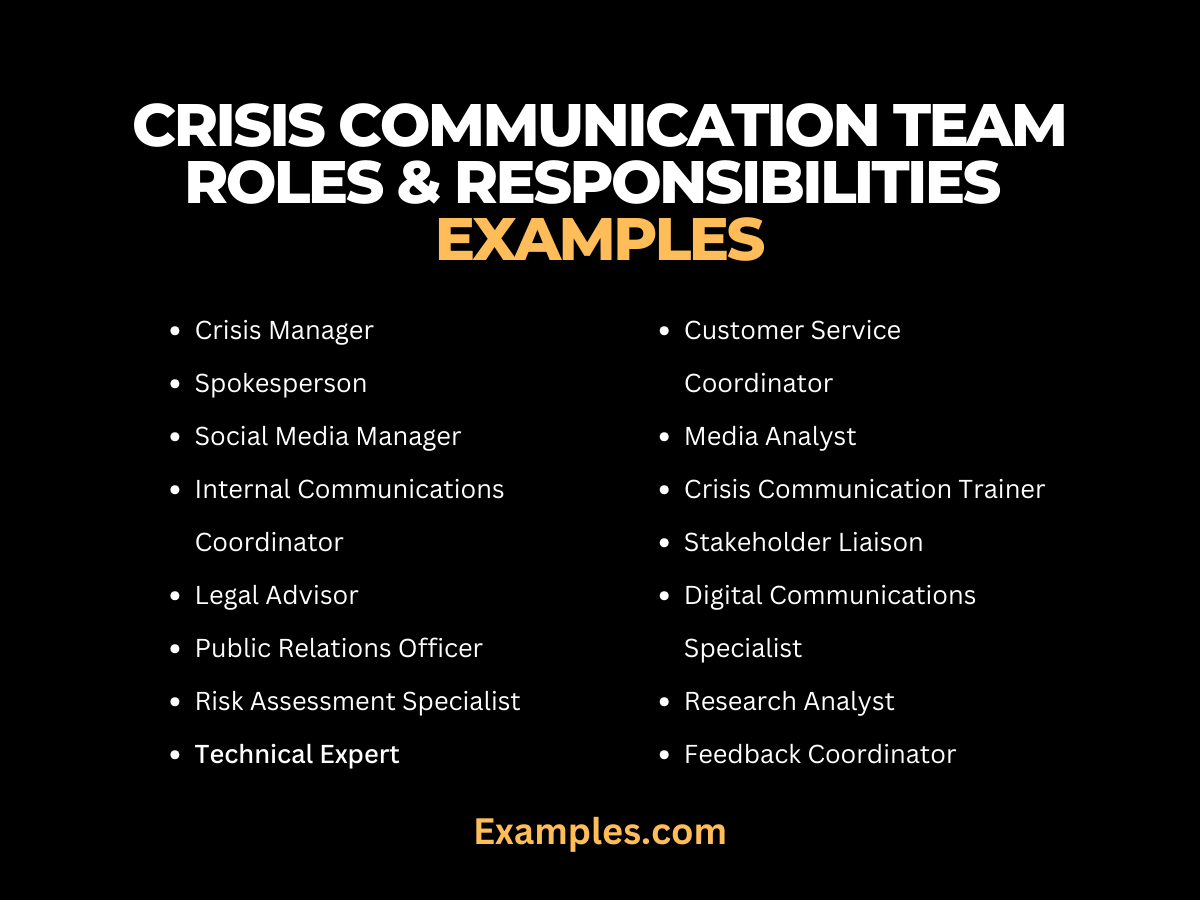
- Crisis Manager
- Leads the crisis response team and develops overall strategy.
- “Our primary objective is to manage this situation effectively and maintain public trust.”
- Spokesperson
- Communicates with the media and public.
- “We are committed to transparency and will provide regular updates as we have them.”
- Social Media Manager
- Manages the organization’s social media channels during a crisis.
- “Please follow our official channels for timely and accurate information regarding the situation.”
- Internal Communications Coordinator
- Keeps employees informed and engaged during the crisis.
- “We encourage all staff to check their emails for regular updates on our response efforts.”
- Legal Advisor
- Provides legal guidance to ensure compliance and manage risks.
- “All communications must be reviewed for legal compliance before release.”
- Public Relations Officer
- Manages the organization’s image and relationship with the public.
- “Our focus is to uphold our reputation while addressing the current challenges.”
- Risk Assessment Specialist
- Analyzes potential risks and impacts of the crisis.
- “Based on our risk assessment, these are the potential impacts and our recommended responses.”
- Technical Expert
- Provides specific technical insights relevant to the crisis.
- “From a technical standpoint, this is the issue and here’s how we are addressing it.”
- Customer Service Coordinator
- Manages customer inquiries and concerns related to the crisis.
- “We are here to answer your questions and address your concerns related to this issue.”
- Media Analyst
- Monitors media coverage and public sentiment.
- “Media analysis shows a need for more clarity in our communication; let’s address this.”
- Crisis Communication Trainer
- Provides training and preparation for crisis communication scenarios.
- “Regular training will ensure our team is prepared for effective communication in crisis situations.”
- Stakeholder Liaison
- Coordinates communication with key stakeholders, including investors and partners.
- “We are in constant communication with our partners to ensure aligned crisis response efforts.”
- Digital Communications Specialist
- Manages online content and digital communication channels.
- “Our digital platforms are updated to provide the latest information and resources.”
- Research Analyst
- Gathers and analyzes data to inform communication strategies.
- “Our research indicates these key concerns among our stakeholders, which we should address.”
- Feedback Coordinator
- Collects and synthesizes feedback for continual improvement.
- “Feedback from our audiences is being collated to refine our ongoing response.”
Crisis Communication Team Roles & Responsibilities in the Classroom
- School Principal as Crisis Leader
- Oversees the entire crisis management strategy in the school.
- “We are taking all necessary steps to ensure the safety of our students and staff.”
- Teachers as Frontline Communicators
- Provide immediate guidance and information to students during a crisis.
- “Follow these instructions carefully for your safety.”
- School Counselors for Emotional Support
- Offer counseling and emotional support to students and staff.
- “We are here to support you through this challenging time.”
- Safety Officer for Emergency Procedures
- Ensures implementation of safety protocols and emergency procedures.
- “Please follow the emergency evacuation plan as practiced.”
- Administrative Staff as Information Disseminators
- Manage communication with parents and external stakeholders.
- “Parents will be kept informed of any developments regarding the situation.”
Crisis Communication Team Roles & Responsibilities in Social Work
- Social Workers as Crisis Responders
- Directly work with individuals and families in crisis.
- “We are here to support you through this crisis and connect you with necessary resources.”
- Case Managers for Individualized Support
- Coordinate comprehensive support plans for clients in crisis.
- “We have developed a tailored plan to address your specific needs during this time.”
- Community Liaisons for Public Communication
- Facilitate communication between the community and social service agencies.
- “We are liaising with community leaders to ensure everyone receives the support they need.”
- Crisis Intervention Specialists
- Provide specialized intervention in acute crisis situations.
- “Our trained crisis intervention team is here to provide immediate assistance.”
- Mental Health Counselors for Emotional Support
- Offer counseling services to those affected by the crisis.
- “Counseling services are available to help you cope with the emotional impact of this crisis.”
What are the Roles and Responsibilities of a Crisis Communication Team?
The Roles and Responsibilities of a Crisis Communication Team are critical for effective crisis management. This team is the nerve center for all communication activities during a crisis, tasked with ensuring that accurate and timely information is disseminated both internally and externally.
- Crisis Team Leader: Heads the team, making key decisions and guiding the overall crisis response strategy. This role requires strong leadership communication and the ability to make quick, informed decisions.
- Media Relations Specialist: Manages all interactions with the media, crafting press releases, and conducting press conferences. It’s crucial for maintaining clear communication and controlling the narrative.
- Social Media Coordinator: Oversees the organization’s social media presence, ensuring consistent and accurate information dissemination while monitoring public response.
- Internal Communications Manager: Keeps employees informed about the crisis and the organization’s response, ensuring effective communication within the organization.
- External Communications Manager: Handles communication with stakeholders, including customers, investors, and the public, maintaining the organization’s reputation during the crisis.
Importance of Crisis Communication Team Roles & Responsibilities
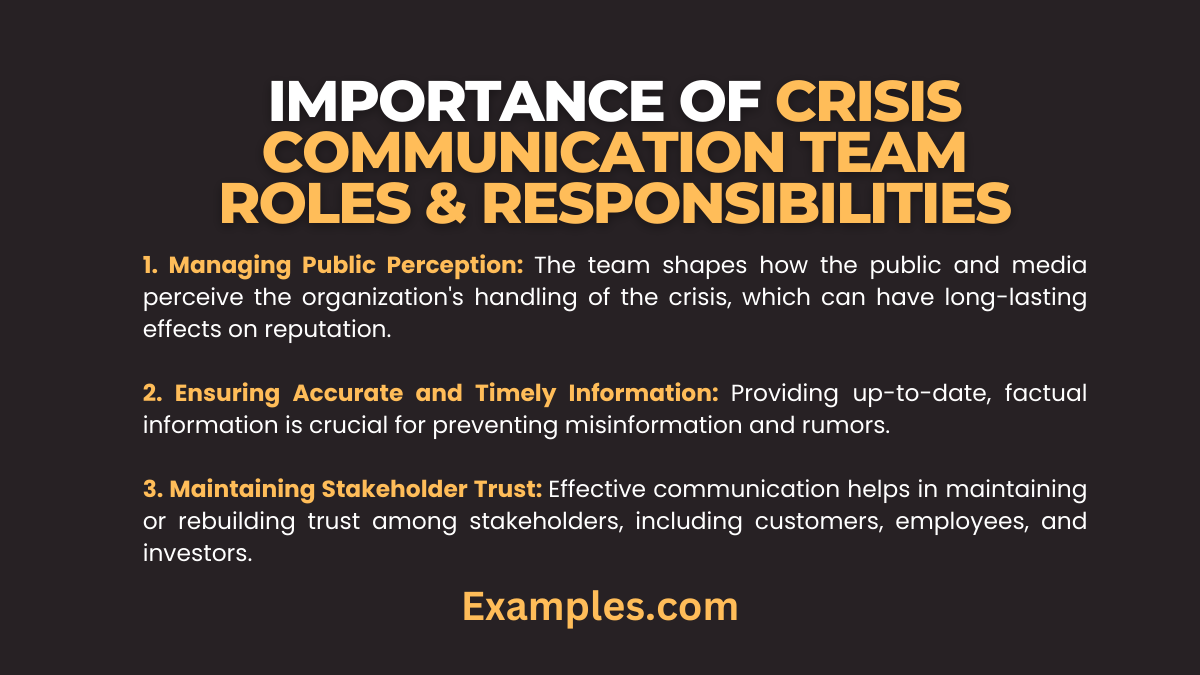
The Importance of Crisis Communication Team Roles & Responsibilities cannot be overstated in today’s fast-paced, information-driven world.
- Managing Public Perception: The team shapes how the public and media perceive the organization’s handling of the crisis, which can have long-lasting effects on reputation.
- Ensuring Accurate and Timely Information: Providing up-to-date, factual information is crucial for preventing misinformation and rumors.
- Maintaining Stakeholder Trust: Effective communication helps in maintaining or rebuilding trust among stakeholders, including customers, employees, and investors.
- Legal and Ethical Compliance: Ensuring communications meet legal standards and ethical norms is vital for the organization’s credibility and legal standing.
- Supporting Organizational Recovery: Post-crisis, the team plays a role in the recovery phase, communicating about steps taken to prevent future crises and restoring normalcy.
In conclusion, the Crisis Communication Team plays an indispensable role in guiding an organization through turbulent times. This article has outlined the diverse roles and responsibilities within such a team, emphasizing the significance of effective communication, strategic planning, and team coordination. Mastery of these roles is crucial for any organization seeking to navigate crises effectively, ensuring that challenges are met with resilience, professionalism, and a clear, unified communication strategy.



